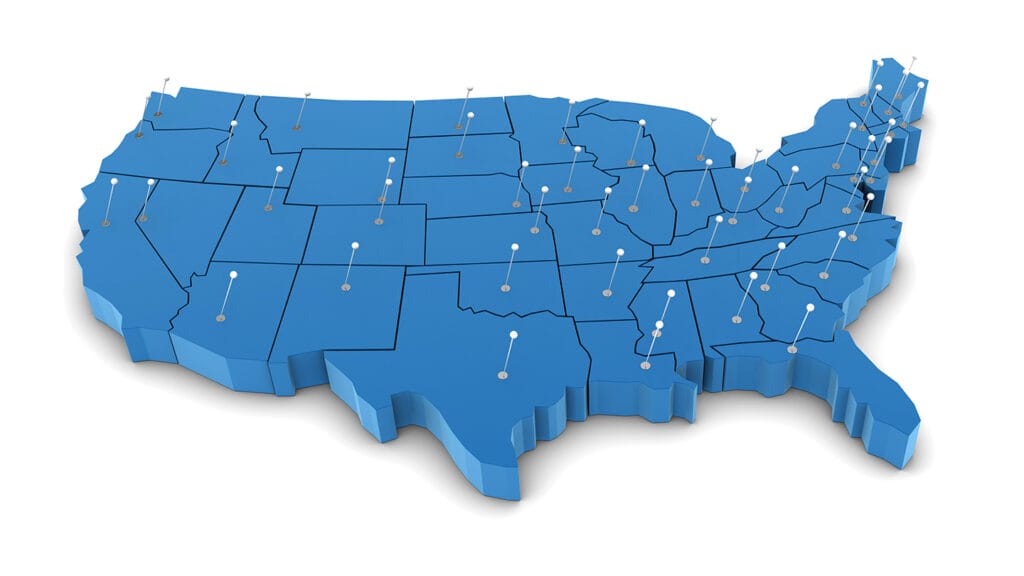When it comes to providing the right home care services for your clients, a multitude of considerations may weigh on your mind. State licensing plays a pivotal role in safeguarding the vulnerable individuals under your care within the realm of home caregiving. It not only assures families of the provision of top-notch care but also guarantees that your caregivers are suitably trained. However, the specific requirements for licensing can vary significantly from one state to another, resulting in a tapestry of regulations across the United States.
In this article, we delve into the intricacies of state licensing for home care, exploring the disparities between licensed and nonlicensed providers to empower your informed decision-making.
Ensuring excellence and safety through licensed home care
Licensed home care agencies operate under the purview of state regulations and are mandated to adhere to specific benchmarks to acquire and uphold their licenses. These requisites encompass a wide spectrum of factors, including the qualifications of your staff, comprehensive background checks, rigorous training programs and a steadfast commitment to safety protocols.
One of the principal merits of embracing licensed home care lies in the assurance of a certain standard of excellence. Licensing plays a pivotal role in upholding these care standards and shielding the vulnerable individuals you serve from potential hazards. Your licensed agency is more likely to employ adept and trained professionals, who have undergone meticulous background evaluations to ensure their suitability for caregiving roles.
Licensing also introduces an elevated level of accountability, an indispensable facet when dealing with a susceptible population. In cases of misconduct or negligence, the licensing authorities possess the prerogative to levy penalties or even revoke licenses. This safeguard is particularly critical when working with mentally incapacitated individuals who cannot advocate for themselves.
Currently, only four states — Michigan, Iowa, Massachusetts and Ohio — do not necessitate licensing for home care providers. However, regulatory landscapes are subject to continuous evolution, and this list could change in the foreseeable future.
Diverse licensing mandates across states
While the overarching objective of licensing remains to ensure the safety and quality of home care services, the specific prerequisites exhibit considerable diversity among states. States exercise their autonomy to regulate and supervise home care services, resulting in myriad licensure criteria.
Certain states may require home care agencies to secure a specific license, while others may mandate individual providers to obtain licensure. These requirements span a gamut of factors, like minimum educational qualifications, requisite training hours, successful clearance of background checks and proficiency assessments.
In some states, licensing mandates may encompass comprehensive oversight and rigorous regulations. These states might have stringent policies governing caregiver-to-client ratios, meticulous documentation standards, and periodic inspections. Conversely, other states might have more relaxed requisites, focusing on fundamental registration or certification.
These discrepancies in licensing mandates across states can lead to substantial variations in the quality of care delivered. While some states prioritize rigorous regulations and comprehensive monitoring, others may adopt more lenient standards, potentially resulting in subpar care quality or insufficient oversight.
Navigating the unregulated terrain of nonlicensed home care
The absence of licensing requisites in nonlicensed home care has garnered a reputation akin to the “Wild West” within the industry. With minimal oversight or regulatory framework, nonlicensed providers can operate without the scrutiny imposed upon licensed agencies. This lack of regulation can lead to untrained caregivers, inadequate screening processes and potential risks to the well-being of clients.
Compounding the challenge is the absence of licensing, which renders it arduous for clients and their families to discern reputable providers from those who might not prioritize quality care. In the absence of licensing, researching and evaluating potential caregivers falls squarely on the shoulders of the client, often exacerbating uncertainty and stress during an already demanding period.
Strategic decision-making: Licensed versus nonlicensed home care
If your caregiving company operates in one of the states that do not mandate licensing, you will face a decision regarding the path to pursue. Opting for licensed home care guarantees a level of assurance pertaining to care quality, given that agencies and providers must meet stringent criteria. The oversight and accountability mechanisms intrinsic to licensing can offer peace of mind to your clients and their families.
It’s also important to recognize that not all nonlicensed providers deliver subpar care. Some nonlicensed providers may possess substantial expertise and unwavering dedication, offering personalized and dependable services. In such instances, undertaking comprehensive research, seeking recommendations, and conducting thorough interviews with potential providers become even more pivotal.
Understanding the differentiating factors between licensed and nonlicensed care empowers you to make judicious decisions concerning the care of your clients. Many different variables contribute to this decision-making process, encompassing financial considerations, geographical location, the level of care required and more. Ultimately, conducting your own state-specific research will facilitate your ability to arrive at an informed conclusion that aligns with your entities unique circumstances.
Lance A. Slatton is a senior case manager at Enriched Life Home Care Services in Livonia, MI. He is also host of the podcast All Home Care Matters, a podcast and YouTube channel. The channel earned the YouTube Creator Award for surpassing 100,000 subscribers. By subscribing to the show, you will gain access to a wealth of information and tips that can help you provide the best possible care for your loved one. Find it on Apple podcasts or YouTube at @AllHomeCareMatters.
Reference:
https://www.manchesterspecialty.com/home-health-care-requirements/



